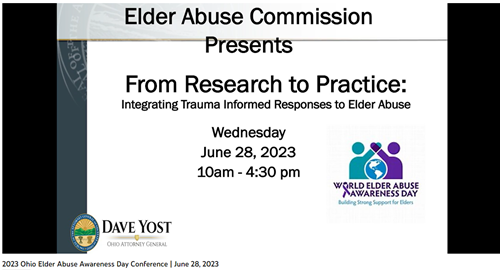
For conference questions, please contact Monica Walker at Monica.Walker@OhioAGO.gov or at 614-728-8461 or Holly Zachariah Andrews at Holly.ZachariahAndrews@OhioAGO.gov or 614-216-4909.
Highlights from the 2023 Ohio Elder Abuse Awareness Day
The Conference had a strong turnout with nearly 200 advocates and professionals joining together to learn about effective strategies for dealing with the growing problem of elder abuse. The 2023 conference focused on the role that trauma plays in the lives and circumstances of older adults and the importance of using trauma-informed approaches. We can all play a part in promoting Elder Justice for all older Ohioans.
Conference Take-Aways
- We explored the value of implementing the principles of trauma informed models of care when responding to allegations of elder abuse and crime victims.
- We increased our awareness of the various types of trauma informed models of care and the impact on older adults.
- Transformational trauma-informed organizations must represent a profound cultural shift that include the following:
- People and their conditions and behaviors are viewed differently
- Staff respond differently (clinical, clerical, security, custodial)
- The delivery of services is conducted differently
- There is no one-time training, but a shift in culture
Recorded Morning Session
(click image below to view the video)

Power Point Slide Decks
(click each link below to view the information)
Morning Plenary Session
From Research to Practice: Integrating Trauma Informed Responses to Elder Abuse, Shelly L. Jackson, PhD, Consultant, Elder Justice initiative, US Department of Justice
Afternoon Plenary Session
Control, Connection and Meaning: Trauma Competent Care, Kim Kehl, Project Manager, Ohio Department of Job and Family Services
Workshop One
Trauma-Informed Victim Services for Older Adults – PPT Handouts
Workshop Three
Understanding Domestic Violence in Later Life & Supporting Victims with Trauma-Informed Responses – PPT Handouts
Workshop Four
Exploring Why Researching Trauma-Informed Responses Matter for Older Adults - PPT Handouts
Resources: